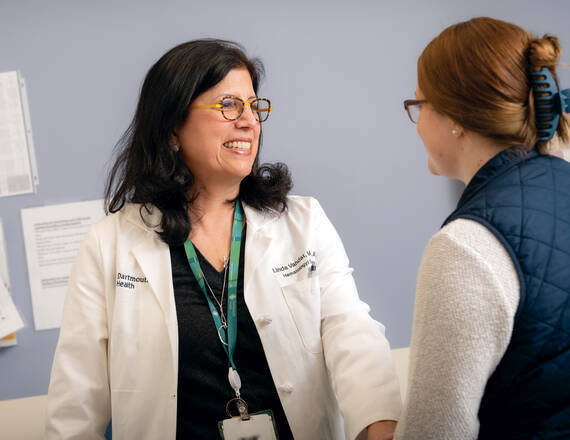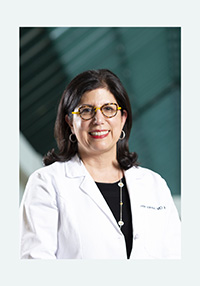The Triple-Negative Breast Cancer Research Fund aims to directly fund and advance Dr. Linda Vahdat’s research at Dartmouth Cancer Center to treat and prevent the recurrence of triple-negative breast cancer (TNBC) and potentially other cancers.

It will support Dr. Vahdat’s mission to disrupt metastasis in TNBC patients by testing how depriving tumors of copper using the anti-copper drug compound tetrathiomolybdate (TM) could transform and improve current TNBC treatment.
Philanthropic support would fund this crucial research, with the goal of establishing TM treatment as the new standard of care for TNBC.
Funding would directly advance treatment by proving that these effective therapies work, ultimately saving lives. Join us in our mission to make TNBC a manageable disease and provide hope to those who wish to live a long life, cancer-free.
What is Triple-Negative Breast Cancer?
TNBC presents a significant challenge in oncology. Because TNBC grows differently than other breast cancers, this subtype of cancer is difficult to treat with existing medications and spreads more readily than other types of breast cancer. As a result, while TNBC can represent 10-20% of breast cancer cases, it is responsible for 30% of breast cancer deaths.
Leading the Charge Against TNBC: About Dr. Linda Vahdat
Linda T. Vahdat, MD, MBA, is a practicing breast oncologist, section chief of Medical Oncology and deputy director of Dartmouth Cancer Center. In her academic role, she serves as the Milham professor and professor of medicine at the Geisel School of Medicine at Dartmouth. Dr. Vahdat started studying breast cancer in the early 1990s. She now has more than 30 years of experience in caring for people with breast cancer, with a focus on triple-negative breast cancer (TNBC), metastatic breast cancer, and breast cancer at high risk of recurring. In her work, Dr. Vahdat has been instrumental in the development of multiple drugs for breast cancer treatment and advancing cancer care. Since 2007, her research has focused on how to deprive tumors of the microenvironment necessary for growth. She is now testing the efficacy of an anti-copper drug compound, tetrathiomolybdate (TM), for TNBC patients at high risk for relapse on current standard treatment. Over the next five years at Dartmouth Cancer Center, Dr. Vahdat plans to validate the safety of TM treatment and compare its efficacy to contemporary therapies, hopefully opening much-needed new doors for TNBC patients worldwide.

“The only way to advance treatment is by proving new treatments work, and the way to prove that they work is by doing clinical trials.”
—Dr. Linda Vahdat
Advancing Research to Save Lives
Dr. Vahdat’s pioneering work investigates tumor dormancy and recurrence. By pinpointing the conditions tumors need to thrive, Dr. Vahdat has discovered how metals, specifically copper, allow cancer to come back, spread, and grow.
Since 2007, Dr. Vahdat has researched how to deprive tumors of the microenvironment they need for growth by using an anti-copper drug compound called tetrathiomolybdate (TM) for TNBC patients who are on standard treatment and at high risk for relapse.
Over the next five years at Dartmouth Cancer Center, Dr. Vahdat’s research will validate the safety of TM treatment and compare its efficacy to current standard treatments, with the hope of opening much-needed new doors for TNBC patients worldwide.
Dr. Vahdat’s preliminary research findings are very promising. However, the need to validate the efficacy of TM treatment is just as urgent.
Tackling the Unique Challenge of TNBC
Dr. Vahdat’s pioneering research in breast cancer began with a fundamental question: Why do some tumors lie dormant for years, only to recur later?
This inquiry led her to investigate the tumor microenvironment, revealing the crucial role of metals, particularly copper, in tumor spread and recurrence.
Through meticulous study and collaboration with scientists and clinicians across various institutions, Dr. Vahdat developed a clinical trial for high-risk breast cancer patients. This trial focuses on depriving tumors of copper using tetrathiomolybdate (TM), a strategy that has shown promising results in preventing metastasis, particularly in triple-negative breast cancer (TNBC).
TNBC is a subtype of breast cancer that lacks expression of estrogen receptor (ER), progesterone receptor (PR), and human epidermal growth factor receptor 2 (HER2). If the cells are missing all three receptors, the cancer is called “triple negative.”
While TNBC accounts for a minority of all breast cancer cases, it is often more aggressive than other subtypes and causes a disproportionately high number of breast cancer deaths.
TNBC is one of the most challenging subtypes of breast cancers to treat, as it lacks features that can be targeted with available drugs. Currently, standard treatment for TNBC typically involves a combination of surgery, chemotherapy, and radiation, with therapies such as poly (ADP-ribose) polymerase (PARP) inhibitors and immunotherapies.
Dr. Vahdat’s research aims to evaluate the effectiveness of copper depletion in preventing metastasis in TNBC patients. She is beyond encouraged by the promise of breast cancer treatment, particularly in immunotherapy and antibody-drug conjugates (ADCs).
Dartmouth Health is actively involved in advancing research in these areas, with a focus on improving outcomes for patients with TNBC through innovative therapies like ADCs targeting the epidermal growth factor receptor (EGFR) gene mutation.
The predominant goal of this research is to redefine TNBC treatment by reprogramming the tumor microenvironment to prevent metastasis, potentially transforming how breast cancer is treated.
Additionally, the research explores copper depletion strategies in other cancers like lung cancer, melanoma, and pancreatic cancer, with plans for further research and therapeutic development in this emerging field.
Early studies show promising results, prompting a randomized Phase II trial of TM led by Dr. Vahdat and her Dartmouth Cancer Center team. The overarching goal is to test whether adding TM to standard therapy for patients at high risk for TNBC relapse can prevent metastasis. The team obtained FDA approval to begin this trial on June 7, 2024. They have since selected and initiated contracts with external clinical sites, submitted the trial for regulatory approval by the Dartmouth Institutional Review Board (IRB), and set up operational infrastructure such as data capture systems and patient support tools. If this study’s results show that the treatment is effective, it will form the basis of a Phase III clinical trial—the final step before reaching patients.
Source of Inspiration: Margy Pisani
Dr. Vahdat cared for Margaret “Margy” Claire Pisani for 22 years. The two met in 1997, when Margy was about 44 years old. At the time, Margy had two little kids and very few options for treatment.

Meanwhile, Dr. Vahdat was working at Columbia University as an oncologist while also testing a novel way to treat breast cancer. Given her situation, Margy saw little downside in participating in experimental research.
“She jumped right in,” Dr. Vahdat recalls. “I think that characterizes Margy. Because she always wanted to be involved and a part of the solution. That’s how she conducted her life.”
Margy would go on to participate in two clinical trials at Columbia. Afterward, she was in remission for almost two decades.
About 15 years after meeting Margy, Dr. Vahdat was running another clinical trial. Although Margy was healthy at the time, Dr. Vahdat explained to her that the risk of relapse never truly goes to zero.
“Margy was a doer,” Dr. Vahdat says. “She was very pragmatic and always wanted to be a part of the solution. She contributed so much to research, and part of her legacy is to never make others go through what she did.”
After living many quality-of-life years with cancer, Margy died peacefully at Memorial Sloan Kettering on Mother’s Day in 2019 surrounded by her family and friends. Contributing to Margy’s legacy will help make a difference in the lives of millions of women with breast cancer. The TNBC Research Fund was established in loving memory of Margy, beloved wife, mom, grandma, and friend.
To learn more about Triple Negative Breast Cancer and how to support this cause, please contact Erin Shreve at Erin.Shreve@hitchcock.org or 603-646-5878.